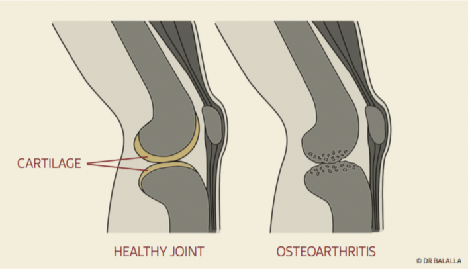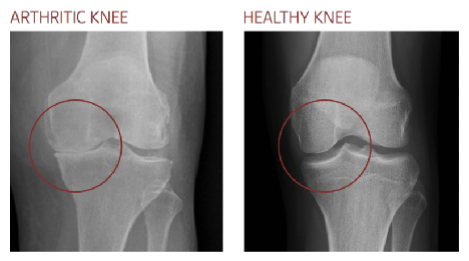What is Knee Osteoarthritis?


Knee Arthritis Arthritis is a condition which causes a degradation of the cartilage lining a joint, leading to a painful joint. Symptoms may include joint pain, tenderness, stiffness, locking (where the knee is unable to fully straighten), and sometimes an effusion (fluid in the joint). The knee typically is less painful at rest, and painful with prolonged activity. The knee may occasionally give way. In more severe cases, night pain may impair sleep.
There are many different reasons for arthritis, but the main type requiring operation is osteoarthritis. This can be separated into primary and secondary osteoarthritis.
Primary osteoarthritis is related to the aging process and typically occurs in older individuals. Its cause is complex, with a genetic basis, occurring in previously intact joints and having no apparent initiating factor.
Secondary osteoarthritis can be the end result of many conditions which can affect a joint. In Ammatory conditions such as rheumatoid arthritis, or trauma to a joint, or any factor which changes the mechanical or metabolic environment of a joint, can lead to secondary osteoarthritis.
Osteoarthritis manifests itself as breakdown of the shiny smooth cartilage which lines the ends of the bone within the joint. These changes then affect the underlying bone. Cartilage damage is irreversible.
- Inherited risk
- Being overweight
- Aging
- Female gender
- Trauma to the cartilage of the knee
- Knee instability and absence of a meniscus
- Heavy occupational loads
- High impact sports
- Acute or chronic inflammation of the knee


The initial treatment of osteoarthritis involves trying to modify activity to avoid pain and further damage. Impact exercises such as running should be avoided. Activities such as swimming or cycling are encouraged to keep active and maintain tness.
Weight loss can have a significant effect on the pain of arthritis., however there are many studies that show loss of 1 kilogram of bodyweight leads to a reduction of around 4 kilograms pressure within the knee joint when walking. This means that the pain of arthritis can be improved with weight loss as it will decrease the stress through the joint. Weight loss has an important role in the prevention of arthritis, with many studies noting the association of obesity and arthritis. One particular study showed a reduction of greater than 50% in the risk for arthritis with each loss of 5kg in a female of average height.
Arthritic patients may also benefit from simple knee sleeves, which can be purchased from pharmacies. These help with swelling control, and can help to modify the sensation of pain.
Ultimately, if pain persists despite medications, and is preventing you from performing your work, leisure, and family activities, surgery may be necessary.
This is most appropriate where the arthritis affects the majority of the knee, if there is significant deformity, or if there is an inflammatory basis to the arthritis, such as rheumatoid arthritis. It involves removal of the diseased cartilage throughout the entire knee, and replacement with a metal and plastic prosthesis. This prosthesis is ideally likely to last over 15-20 years.





